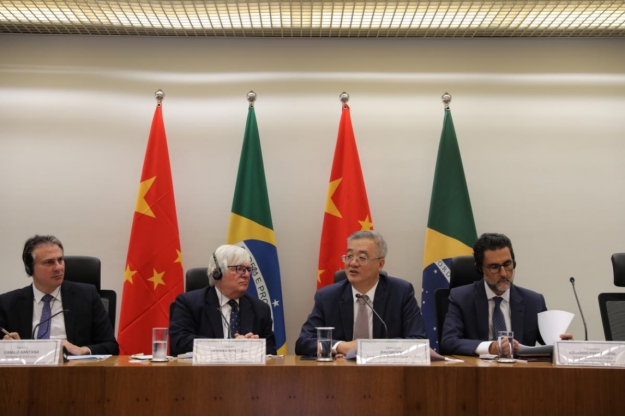(By Lei Xiangping, CRI Online)
The 1st STJ Brazil-China Law Congress, co-hosted by Brazil’s Superior Tribunal of Justice (STJ) and China University of Political Science and Law, convened in Brasília, the capital of Brazil, on March 11 local time. More than 20 legal experts from China and Brazil engaged in in-depth discussions on “legal issues related to the environment and artificial intelligence”. Zhu Qingqiao, the Chinese ambassador to Brazil, and Herman Benjamin, the president of the STJ, delivered keynote speeches at the event.

Ambassador Zhu Qingqiao (Second from Right) Attended the Congress
At the opening ceremony, Ambassador Zhu Qingqiao stated that “Environment and Artificial Intelligence” represents both the theme of this event and a pressing issue of great concern to the international community. China takes these issues very seriously and has been actively engaged in addressing them. The congress serves as an opportunity for China to work with Brazil to identify new avenues for international legal cooperation in the fields of environment and artificial intelligence, allowing both sides to share opportunities, overcome challenges, and achieve win-win outcomes. Ambassador Zhu put forward two proposals:
“First, the two sides should enhance bilateral legal cooperation through sustained dialogue. As China and Brazil align the Belt and Road Initiative (BRI) with Brazil’s development strategies, it is essential to advance ‘hard connectivity’ in infrastructure by enhancing practical cooperation in finance, production chains, green transition, and tech innovation. At the same time, efforts should be made to improve ‘soft connectivity’ in policies, rules, standards, and mechanisms. China is willing to facilitate deeper exchanges between the judicial and legal communities of both countries. Second, countries should uphold the rule of law in a changing world through reinforced multilateral collaboration. In addressing shared challenges like climate change and AI governance, we should safeguard international law and advocate solidarity, rather than resort to bloc confrontation and zero-sum mentalities. China is ready to work with Brazil to enhance legal exchanges and cooperation within multilateral frameworks such as the China-CELAC Forum, BRICS, and the United Nations, with aims of improving the Global South’s influence in international legal affairs, and providing legal solutions to safeguard the common interests of developing countries.”
The congress featured presentations on “China’s Legal System” made by nine legal experts from seven Chinese universities, including China University of Political Science and Law, Renmin University of China, Wuhan University and Southwest University of Political Science and Law. Accordingly, twelve legal experts from eleven top Brazilian law schools presented their insights on “The Fundamental Structure of Brazil’s Constitutional System”. Following these presentations, participants engaged in group discussions on the two key topics of “Environmental Law” and “Artificial Intelligence Law”.
Herman Benjamin, the president of the STJ, stated in an interview with CRI that strengthening exchanges and interactions between legal professionals from Brazil and China is of great significance. He said:
“While China stands as Brazil’s largest trading partner - exceeding our trade volume with the EU and United States - our legal systems haven’t had any substantive dialogue. This is why the Superior Tribunal of Justice decided to host the first Brazil-China Law Congress—to bridge the gap between our legal systems, facilitate mutual learning, and foster connections between judges from both countries. Having launched the first law congress, we plan to hold a second one next year. Naturally, it is our intention to make the congress an annual event.”
This congress has established a solid foundation for academic collaboration between Chinese and Brazilian law schools. This partnership will expand to include legal practice, legal talent development, and other areas of legal cooperation between the two countries. Authoritative sources indicate that the second Brazil-China Law Congress will be held in 2026 at China University of Political Science and Law.
Shi Jianzhong, vice president of China University of Political Science and Law, emphasized the profound significance of legal forums in fostering cooperation between China and Brazil. He stated:
“Our delegation comprises leading representatives from China’s legal institutions, with each participating institution sending experts in relevant fields for in-depth exchanges here in Brazil. This congress holds profound importance across multiple dimensions in enhancing legal and academic exchanges, ensuring economic cooperation and openness, advancing the BRI cooperation, and promoting the sharing of national governance experiences.”
(Edited by Lu Huayu)
Link to CRI Online: https://news.cri.cn/2025-03-12/28cab87c-d87c-da89-d8b8-7efe87a22315.html

